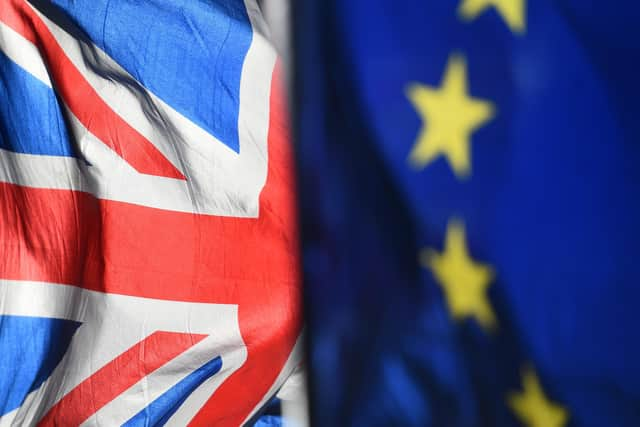How the tide is beginning to turn in our relationship with the EU - Lord Kirkhope
However, the tide is beginning to turn, thanks in no small part to the efforts of our Prime Minister in securing the Windsor Framework agreement. This achievement, which exceeded expectations, serves as a beacon of what can be accomplished through negotiations grounded in sincerity and a willingness to compromise.
This Framework marks the beginning of a new chapter, one characterised by closer cooperation and a renewal of trust. Our reassociation with Horizon Europe and Copernicus, the EU's flagship research and Earth observation programmes, demonstrates this new direction. The refresh of the Government’s Integrated Review last year filled the Europe-shaped hole of its predecessor and acknowledged the benefits of working with European institutions.
Yet, there remains much to be done.
Advertisement
Hide AdAdvertisement
Hide Ad

We need to build on the momentum created by the Windsor Framework. The Trade and Cooperation Agreement, negotiated under the pressure of time constraints, has its shortcomings. It necessitated the disentanglement of complex political, economic and legal ties, resulting in a free trade agreement that introduces red tape for local businesses and largely omits provisions for services and foreign policy cooperation—areas ripe for enhancement.
Over half of our region’s trade – both imports and exports – is with the European Union; the Government must do more to support them.
In my capacity as a Patron of the Conservative European Forum (CEF), a centre-right group championing greater cooperation with Europe, I’ve been involved in a year-long inquiry into our relationship with the EU. We have talked to companies, business and trade organisations and other experts - including the CBI, the National Farmers Union, the City of London Corporation, British Chambers of Commerce, and the Institute of Directors - to hear the challenges they are facing and the solutions we can put forward to effectively address them.
The report finds that practical improvements to Britain's relations with the European Union are achievable, would be welcomed by British business, and add to the prosperity and security of the British people.
Advertisement
Hide AdAdvertisement
Hide AdOn the trade front, our businesses continue to navigate a maze of non-tariff barriers, compounded by the need to deal with 27 different jurisdictions. Our current agreement adds red tape, additional friction, and needless forms to be filled in. The services sector, in particular, faces significant hurdles, especially for professionals undertaking short-term work in the EU. Our report recommendations include a new veterinary agreement with the EU to reduce checks at the border and remove the need for Export Health Certificates. We also suggest, among other things, a cultural touring agreement to allow our creative industries to flourish in the European market once again; a youth mobility partnership to support cultural exchanges and address labour shortages in the hospitality and agriculture sectors; expanding the list of activities UK professionals can undertake in the EU without requiring a visa or work permit, and joining the Pan-Euro-Mediterranean Convention to ease ‘rules of origin’ requirements.
The challenges we face are not just bureaucratic but are underscored by the broader geopolitical landscape, with Russia’s aggression towards Ukraine highlighting the critical importance of European unity and cooperation. The absence of formal mechanisms for foreign and defence policy cooperation in the TCA is a glaring omission that we must address. With the possibility of Donald Trump being elected as President of the United States later this year, the UK must be ready to respond to foreign policy challenges with its European partners.
We propose a new framework participation agreement, allowing the UK to selectively engage with EU operations, maintaining our strategic autonomy while fostering collaboration. Additionally, a strategic partnership agreement, akin to that between the EU and Canada, would formalise areas of consensus and provide a structured basis for cooperation.As an MEP, I was involved in the drafting of the EU’s data protection rules, which, since Brexit, have become the UK’s data protection rules. A key recommendation I advocated for was to ensure that the UK’s domestic legislation does not deviate from the EU’s to an extent that risks ‘data adequacy’, a term that allows data to flow uninterrupted between both jurisdictions. By the Government’s own estimates, the loss of the EU’s adequacy decisions would cost businesses between £2.3bn and £4.6bn in one-off costs and lost annual export revenue over the next 10 years.
As we navigate this new chapter of UK-EU relations, let us do so with an eye towards constructive engagement, recognising the immense potential for a partnership that is both beneficial and reflective of our shared values and interests.
Lord Kirkhope of Harrogate is the former MP for Leeds North East and MEP for Yorkshire.
Comment Guidelines
National World encourages reader discussion on our stories. User feedback, insights and back-and-forth exchanges add a rich layer of context to reporting. Please review our Community Guidelines before commenting.